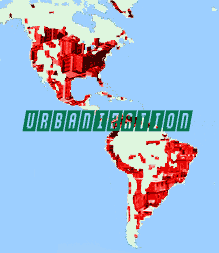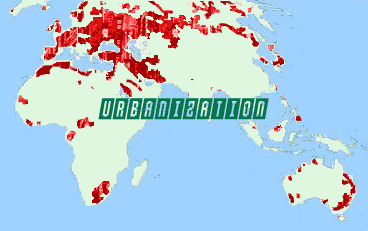|
from 05 may 2002 blue vol II, #32 |
|
|
The Imperative of Agrarian-Based Localization by By Rachel Guevara and Marcel Idels
Mega-City Spin Control
When things happen in the world like the 9-11 bombings of New
York and Washington DC or the Antarctic ice shelf melt, don’t
believe the US and experts who say, WE were not fully aware of
the threat. They lie for money. Millions of government and
corporate researchers study everything and they know it all, even
if their narrow viewpoint keeps them from understanding the true
implications of public policies.
Among a multitude of crimes of omission and
misrepresentation, the corporate media and the “loyal” scientific
community are fabricating a fatal excuse for citizen denial about
the long run effects of globalization. We are fed the storyline that
endless growth is good and that progress requires the
intentional creation of hundreds of large unsustainable cities
and dozens of mass-polluting megacities of more than 10
million people each [2 footnotes].
It is difficult to fathom what the corporate rulers are after with
these policies, but the effects of this disaster are already before
our eyes.
The WTO and globalized free trade create a frenzy of economic
activity and investments. This increases the supply of goods and
thus commodity prices continue to plummet [3 footnotes]. This price
collapse is driving small farmers off the land and into the cities
in many regions. Many of these small farmers through their own
labor maintained higher productivity with fewer manufactured or
imported inputs than large farms [4 footnotes]. Government and
international policies favoring the rich and denying participatory
democracy to the poor have accelerated these problems and
prevent people from defending themselves nonviolently [5 footnotes].
These policies are leading to increased urbanization around the
world. There will soon be 36 megacities up from 23 in 2000.
Three hundred cities of more than one million will exist by 2025.
There are several regions like Sao Paulo, Brazil and Mexico City,
with agglomerations of more than 20 million people (headed to
thirty million). Lima, Peru and Rio de Janeiro, Brazil will
approach the 20 million mark too. Increased urbanization near
coastlines is unsustainable because of global warming sea
level rises (New York, Shanghai, Tokyo, Los Angeles, Dhaka,
and many more) [6 footnotes].
A walk down the mean streets of Jakarta, Lagos or Bogotá, with
their creaking infrastructure, smog, crime, open sewers, piles of
garbage and limited clean water supplies - and soaring
populations - will do little to instill faith in the future.
Examples abound of the denial and spin control used to hide the
calamity of rapid and premature urbanization. The Economist
informs us that In the long run urbanization is good news… Man
is a gregarious species, and the words ‘urbane’ and ‘civilised’
both derive from the advantages of living in large settlements.
Cities make the world go round. If there is one thing that
EVERYBODY agrees on, it is that urbanization is unstoppable.
[7 footnotes] Intentionally narrow-minded nonsense like this is why the
world is in such a terrible mess.
Any new development program or restructuring of the
international economic system has to lead to solving all of these
problems and also the problems of tribalism, disease, war and
terrorism, global warming [8 footnotes] and the personal/social
alienations (drug use, abuse of women, mental illness) that are
rampant in all societies [9 footnotes]. There is no program of modest
reforms that will solve or even keep pace with these problems.
A u-turn away from corporate fascism and US global domination
leads to a world based on natural resource conservation and
economic policies of Localization: the Earth Charter [11 footnotes]. The
generalized crises of modern human civilization demand that
emergency policies be adopted quickly.
To realize the Earth Charter many groups from Food First [12 footnotes]
and Via Campesina [13 footnotes] to India’s Vandana Shiva and the
International Forum on Globalization [14 footnotes] have been working on
a range of policy proposals. The Porto Alegre Statements [15 footnotes]
and the A Better World is Possible, publication are two of the
better-known proposals.
The International Plan for Earth (IAPE) has evolved from the work
of organizations at the World Social Forums and the worldwide
resistance to corporate globalization and the WTO [16 footnotes]. Some
groups have suggested that additional policies and values
should be included in this plan for international economic
restructuring. [17 footnotes].
The social scientists and community leaders who drafted the
plan feel that The 7 Point Strategy for IAPE accomplishes the
necessary restructuring for a global transformation and a lasting
peace that will enable a shared culture of respect for each
culture and for the values of the Earth Charter. The designs for
an International program of land reform, agrarian reform and
ecological development (IAPE Section II.3) are left up to
communities and teams of regional scientific panels to
accommodate local customs and resources [18 footnotes].
INTERNATIONAL ACTION PLAN FOR EARTH
An economics of Democratic Localism with the priorities of a
small farm society can avert the escalating instability of poor
countries, by reducing waste, pollution and corruption;
redistributing income; raising farm productivity with fewer inputs;
improving rural standards of living and halting urbanization.
A Reasonable and Modest Proposal
Bans on arms shipments and excessive military spending have
been debated since the end of World War I. With the end of the
Cold War and the collapse of the USSR most people around the
world anticipated a peace dividend that would transfer former
military spending to social and ecological needs [49 footnotes].
The failure of the West to switch military spending to sustainable
development programs in the Third World is the main reason
why one sees the planet beset with the chaos of terrorism, war
and economic collapse [50 footnotes].
Many consumers in developed countries support an end to
chemical intensive farming practices , which continue to poison
the children, the soil and the water [51 footnotes]. The US and Europe
have committed themselves to ending agricultural production
and export subsidies which harm the farmland soils and distort
commodity prices making a mockery of free trade and at the
same time destroying efficient small farmers everywhere in the
world [52 footnotes].
However, the US Senate passed a new ten-year farm bill in June
of 2002 that completely violates the spirit of the Uruguay Round
and the Doha commitments [53 footnotes]. President Bush has launched
a trade war against the world and continues to resist
international legal and environmental agreements which 95
percent of the world have endorsed [54 footnotes].
Enforcement mechanisms for many of the demands of the IAPE
are called for under the Earth Charter and initial steps toward a
legally binding instrument on development and environment are
on the agenda for the 2002 Earth Summit in Johannesburg,
South Africa [55 footnotes].
An International Social Investment Fund for Worldwide
Ecological Agrarian Programs: Sustainable Rural Development
and Citizen Participation
The most controversial and important component of the plan is
Section II.3. Taxes on trade, financial transactions and fossil
fuels will fund a comprehensive international program of land
reform, agrarian reform and ecological rural development. More
controversial yet is the provision that this new development fund
would replace the WTO, IMF and World Bank [56 footnotes]. A deep
restructuring, beginning with agriculture and the need for
large-scale support for ecological rural development, is the
choice that leads to equity and peace.
Many groups have called for international taxes to help poor
people and developing countries [57 footnotes]. At the 2002 Monterrey,
Mexico Summit, countries from around the world agreed to
support the Tobin Tax on international financial transactions
[58 footnotes]. The Earth Charter and many economists have also called
for taxes on fossil fuels to capture the unvalued externalities from
fossil fuel pollution and to help switch consumers and industry
to less polluting energy sources [59 footnotes].
The International Plan for Earth demands that we go much
farther and quickly. It pulls all of these well-meaning proposals
together into a comprehensive and effective new economic
program that can make a difference in the sustainability of poor
countries and the Earth.
This economic alternative supports a market economy [60 footnotes] but it
does not allow for corporate capitalism or a market with
concentrations of political power or market power. Corporate
Capitalism destroys democracy, markets and small enterprises.
It leads to an unequal distribution of wealth property and
incomes. Corporate Capitalism makes bad decisions against
the will of the people and the sustainability of the future. The kind
of corporate capitalism that stalks the world today has nothing to
do with a free market or what Adam Smith and the original free
marketers believed a free market economy should be [61 footnotes].
The same is true for the many purported Democracies that the
US champions when it needs to. The idea that any country is very
democratic is a ludicrous denial of all history and a slight at what
humans are capable of [62 footnotes].
For many decades corporations have received subsidies for
investment, insurance and export promotion - and billions of
dollars worth of government and university research assistance,
grants and training (corporate socialism for growth) [63 footnotes]. Now it
is time to reverse this bias of subsidies for the rich and powerful
and make reparations to the people, small enterprises and
low-tech green investments.
Expand options, experiments and diversity - not one market, one
culture, one way! The Earth Charter is the pluralistic and equity
seeking way forward. The economic model for this new way is
based largely on the ideas of Localization guided by
sustainability requirements.
The Economics of Localization
Contrary to the propaganda, the global economy cannot enable
villagers in rural China, Bangladesh or Ecuador to live the lives
of middle-class Westerners. For the majority it cannot even
provide the most basic needs of housing, education, health care,
nutrition and employment. Globalization increases the gap
between rich and poor, pulling a vast number of people away
from the land and into squalid urban slums. Preventing further
urbanization in the South requires programs that actively support
the rural economy.
Such changes require major shifts of emphasis in the
economies of the North, and an end to corporations using the
South as both larder and dumping ground -stripping whole
countries of their natural resources…the North must produce
most of its own goods and services. -Helena Norberg-Hodge,
Director of the International Society of Ecology and Culture [64 footnotes].
At the beginning of this article we discussed the high-tech
corporate one-world path that society could follow - megacities.
The Earth Charter opposes this path and suggests another one
- a green way of local economics and low consumption. This
hopeful and sustainable path may be hard for some people to
understand or accept. We ask you to involve yourself, to work to
understand the options for restructuring and to make your voice
heard.
A new politics of Democratic Localism guided by the Economics
of Localization and the values a small farm society is the way out
of a world of billionaires ruling billions of desperate urban
refugees. A new world will have no global corporations, limited
long-distance trade and it will be fueled by a cooperative
peaceable economy of sharing and renewable resources.
This path requires the prioritization of our efforts and resources
to meeting the basic needs of all people in sustainable ways.
Wendell Berry states the case for Localization as, The idea of a
local economy rests on two principles: neighborhood and
subsistence. People ask what they can do or provide for one
another, and they find answers that they and their place can
afford. This is part charity and part economic… there is a
significant charity in just prices.
Everything needed locally cannot be produced locally. But a
viable neighborhood or community, like a viable farm, protects its
own production capacities. It does not import products that it can
produce for itself. And it does not export local products until local
needs have been met. This is the principle of subsistence…and
it applies to regions and nations as well. [65 footnotes]
Localization prioritizes small farm, low-input agriculture and
regional self-reliance. Once international pressure and financing
are brought to bear on the corrupt elite and political parties in
most countries, these goals can be quickly met in poor countries
and will serve as models of sustainability for all people. The
people are ready and eager for something new and beyond
neoliberalism and the Democracy of the Façade [66 footnotes].
Neo-liberal economists and even many well-meaning
development organizations will dismiss the ideas of Localization
as protectionist [67 footnotes]. And that is exactly what they are -a
protectionism that is socially just and ecologically sound
because it protects local producers and the natural resources
(soils, streams, forests) and it is the best assurance of
adequate supplies to local consumers.
Localization is not isolationism. The principle of subsistence
(low consumption/reduced waste) is the best guarantee of a
marketable surplus from a region. Peace and neighborliness
will lead to expanding ripples of charity and aid to the less
fortunate.
Democratic Localism with the priorities of a small farm society
can avert the escalating instability of poor countries, by reducing
waste, pollution and corruption; redistributing income; raising
farm productivity with fewer inputs; improving rural standards of
living and halting urbanization.
The IAPE replaces the World Trade Organization, the IMF and the
World Bank with a global tax on trade, finance and fossil fuels.
These taxes would be administered by the UN as the
International Social Fund for Sustainable Development.
Education, health care and support for subsistence farmers,
including crop subsidies, will be the priorities. Sustainability
guidelines, research and education can help keep this new
economic structure on target. Existing models of successful
programs in Kerala, India; Cuba; Bangladesh; Brazil and
elsewhere can be adapted to fit the cultural and unique
situations around the world [68 footnotes].
Key to this program will be a new type of participatory local
democracy, like the examples from Porto Alegre and other
Brazilian communities [69 footnotes]. Also relevant is the knowledge that
people are gaining from the collapse of Argentina (and now
Uruguay, Paraguay, Colombia and…) and the formation of new
organizations of civil society -the Unemployed Piqueteros and
the Popular Assemblies of neighborhoods, communities and
regions [70 footnotes]. The Bolivarian Circles of Caracas, Venezuela are
also practicing grassroots community improvement in the poor
slums of a potential coastal megacity [71 footnotes].
Storm Clouds and the Wildcard President Bush (shh!)
At the Rio+10 Earth Summit there will be complaints about how
poorly the rich countries have done in meeting their
commitments to sustainability in 1992. The Earth Charter and
other resolutions will be passed and a few action programmers
will be drawn up as Partnership-Initiatives for sustainable
development.
The stranglehold of the WTO and its corporate clients on the
controls of the world will not be broken by this Summit [72 footnotes]. The
value of the Earth Summit and the Earth Charter is that they lend
validity and legitimacy to the rising tide of rebellion against US
and corporate hegemony. At this moment of global crisis and
human opportunity, International Civil Society asserts itself -The
People -are already beyond the Earth Charter. They demand a
New World of ecological possibilities and sustainable options -
A world that they will control.
Business leaders around the world will pressure the US to move
forward with restructuring the world economy because they know
that if they don’t compromise and undercut the demands of Civil
Society then revolution is likely to spread along with economic
collapse.
All the power that rests in Wall Street and the International Banks
is as nothing compared to the force of millions of people taking
over the streets of their capitals and the largest cities to demand
sensible change now.
That day is coming.
– Rachel Guevara and Marcel Idels
|
||||||||||||||||||||||||
|
BLUE is looking for short fiction, extracts of novels, poetry, lyrics,
polemics, opinions, eyewitness accounts, news, features, information and arts
in any form relating to eco cultural- social- spiritual issues, events and
activites (creative and political). Send to Newsdesk. |

 Five hundred billionaires sit atop the greatest treasure ever
accumulated - $1.6 trillion - more than the incomes of half the
world combined. Of the 12 individuals who posses more than
$20 billion each, only two are not US citizens: Saudi Prince bin
Talal Alsaud and the German Albrecht brothers. The founders of
Microsoft, Gates and Allen, have enough money to create 76,000
millionaires. Switzerland has the highest per capita number of
billionaires at 13. Thirty-five women are also billionaires [1
Five hundred billionaires sit atop the greatest treasure ever
accumulated - $1.6 trillion - more than the incomes of half the
world combined. Of the 12 individuals who posses more than
$20 billion each, only two are not US citizens: Saudi Prince bin
Talal Alsaud and the German Albrecht brothers. The founders of
Microsoft, Gates and Allen, have enough money to create 76,000
millionaires. Switzerland has the highest per capita number of
billionaires at 13. Thirty-five women are also billionaires [1  The kind of future the world must avoid is one with a thousand
billionaires chased by twenty million millionaires gorging
alongside the vast majority of people who will be crowded into
polluted and expanding cities. We must avoid this dystopia at any
cost - and by any means necessary. [10
The kind of future the world must avoid is one with a thousand
billionaires chased by twenty million millionaires gorging
alongside the vast majority of people who will be crowded into
polluted and expanding cities. We must avoid this dystopia at any
cost - and by any means necessary. [10  Most of the IAPE is not controversial. Even the Catholic Church
has endorsed major debt relief for poor countries that are
struggling to feed, house and educate their people [48
Most of the IAPE is not controversial. Even the Catholic Church
has endorsed major debt relief for poor countries that are
struggling to feed, house and educate their people [48  Localization is about shortening the distance between
producers and consumers. It is not against all trade, but rather it
is about reducing to an absolute minimum the waste now
caused by having everything from butter to raw logs
crisscrossing the globe.
Localization is about shortening the distance between
producers and consumers. It is not against all trade, but rather it
is about reducing to an absolute minimum the waste now
caused by having everything from butter to raw logs
crisscrossing the globe.
 The neo-liberal free trade and structural adjustment programs of
the IMF, World Bank and US multinational corporations (WTO
World Government) have failed to reduce poverty and are now
threatening to create chaos around the world by destroying rural
economies and increasing urbanization.
The neo-liberal free trade and structural adjustment programs of
the IMF, World Bank and US multinational corporations (WTO
World Government) have failed to reduce poverty and are now
threatening to create chaos around the world by destroying rural
economies and increasing urbanization.